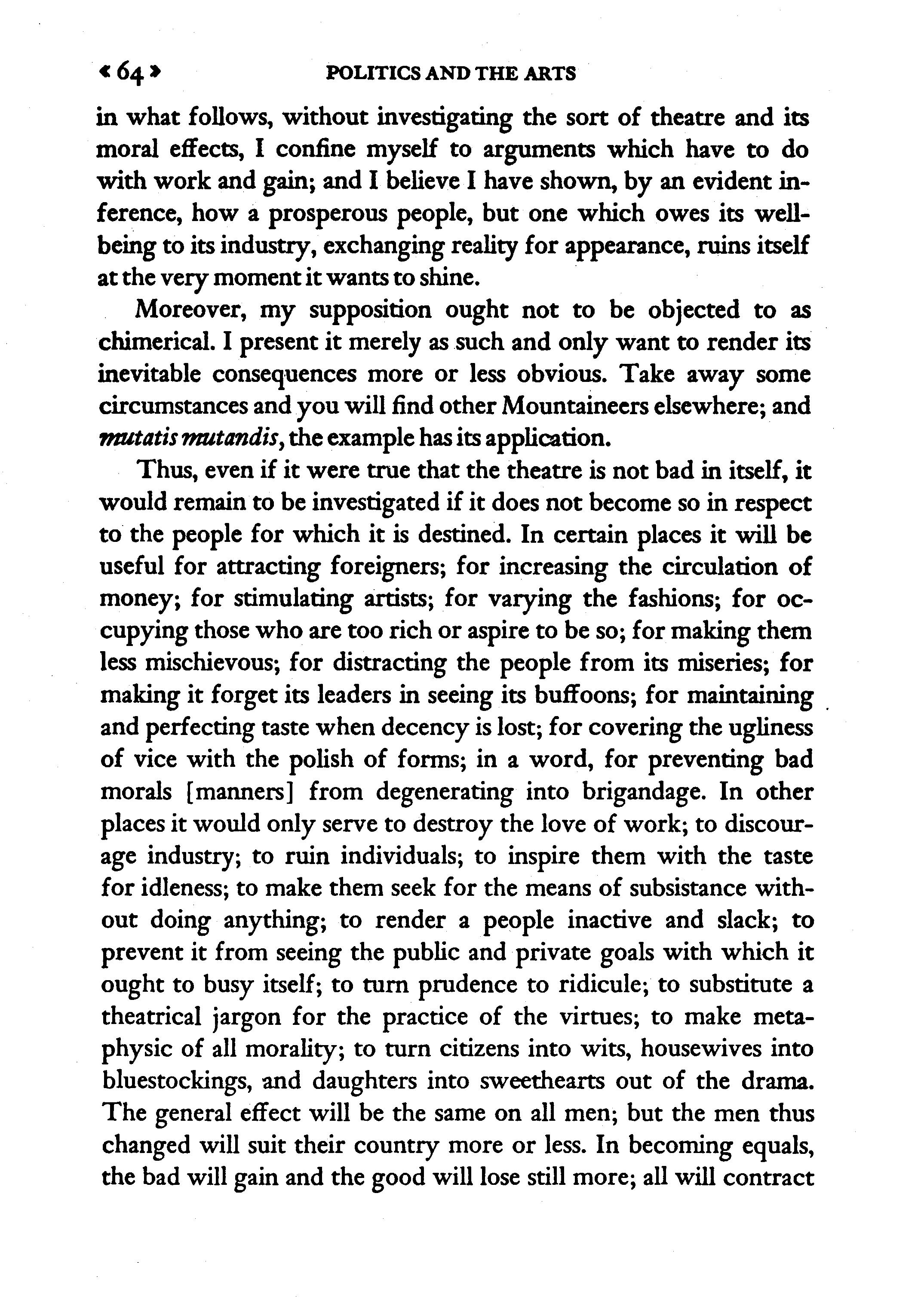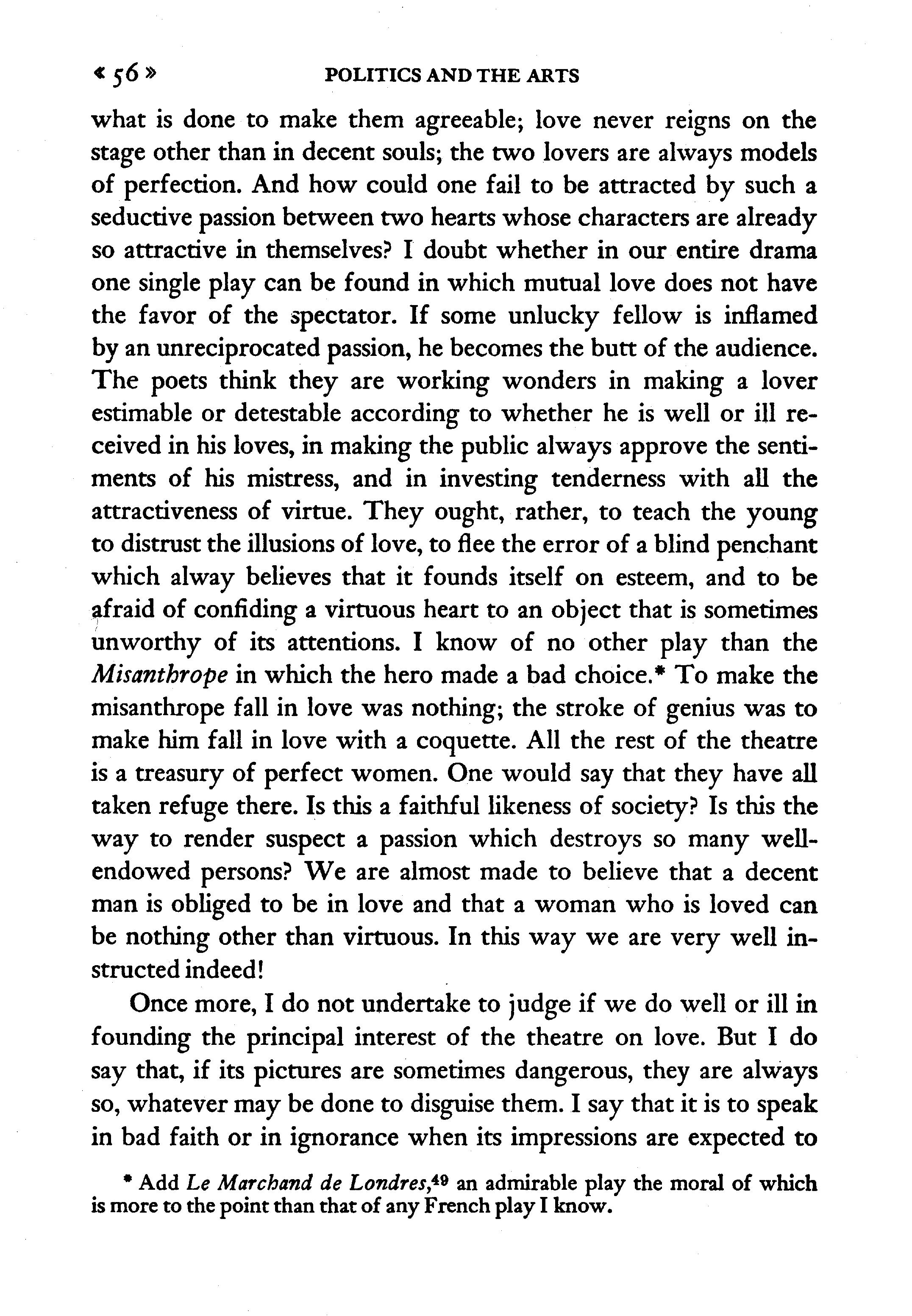
16 minute read
VI. THE THEATRE AND LUXURY
what is done to make them agreeable; love never reigns on the stage other than in decent souls; the two lovers are ahvays models of perfection. And how could one fail to be attracted by such a seductive passion between two hearts whose characters are already so attractive in themselves? I doubt whether in our entire drama one single play can be found in which mutual love does not have the favor of the spectator. If some unlucky fellow is inflamed by an unreciprocated passion, he becomes the butt of the audience. The poets think they are working wonders in making a lover estimable or detestable according to whether he is well or ill received in his loves, in making the public always approve the sentiments of his mistress, and in investing tenderness with all the attractiveness of virtue. They ought, rather, to teach the young to distrust the illusions of love, to flee the error of a blind penchant which alway believes that it founds itself on esteem, and to be of confiding a virtuous heart to an object that is sometimes unworthy of its attentions. I know of no other play than the Misanthrope in which the hero made a bad choice.· To make the misanthrope fall in love was nothing; the stroke of genius was to make him fall in love with a coquette. All the rest of the theatre is a treasury of perfect women. One would say that they have all taken refuge there. Is this a faithful likeness of society? Is this the way to render suspect a passion which destroys so many wellendowed persons? Weare almost made to believe that a decent man is obliged to be in love and that a woman who is loved can be nothing other than virtuous. In this way we are very well instructedindeed!
Once more,I do not undertake to judge if we do well or ill in founding the principal interest of the theatre on love. But I do say that, if its pictures are sometimes dangerous, they are always so, whatever may be done to disguise them. I say that it is to speak in bad faith or in ignorance when its impressions are expected to
Advertisement
• Add Le Marchand de Londres,4:9 an admirable play the moral of which is more to the pointthan thatof any French playI know.
be rectified by other foreign impressions which do not accompany them to the heart, or which the heart has soon separated outimpressions which even disguise the dangers and give to this perfidious sentiment a new charm with which it destroys those who abandonthemselvestoit.
Whether we deduce from the nature of the theatre in general its best possible forms, or whether we examine all that the learning of an enlightened age and people has done for the perfection of ours, I believe that we can conclude from these diverse considerations that the moral effect of the theatre can never be good or salutary in itself, since, in reckoning only its advantages, we find no kind ofreal utility without drawbacks which outweigh it. Now, as a consequence of its very lack of utility, the theatre, which can do nothing to improve morals [manners], can do much toward changingthem. In encouraging all our penchants, it gives a new ascendency to those which dominate us. The continual emotion which is felt in the theatre excites us, enervates us, enfeebles us, and makes us less able to resist our passions. And the sterile interest taken in virtue serves only to satisfy our vanity without obliging us to practice it. Hence, those of my compatriots who do not disapprove ofthetheatreinitselfarein error.

VI
BEYOND these effects of the theatre, which are relative to what is performed, there are others no less necessary which relate directly to the stage and to the persons who perform; and it is to them that the previously mentioned Genevans attribute the taste for luxury, adornment, and dissipation, whose introduction among us they rightly fear. It is not only the frequenting of actors, but also the frequenting of the theatre, which, because of the costumes and jewelry of the players, can introduce this taste. If the theatre had no other effect than to interrupt the course of civil and domestic
affairs at certain hours and to offer an assured resource to idleness, it is impossible that the opportunity of going every day to the same place to forget oneself and becoming involved with foreign objects should not give other habits to the citizen and form new morals [manners] for him. But will these changes be advantageous or harmful? This is a question that depends less on the consideration of the theatre than on that of the spectators. It is certain that these changes will bring them all pretty nearly to the same point. It is, then, from the situation of each at the beginning that the differencesmustbe estimated.
When amusements are by their nature indifferent (and I am willing to consider the theatre as such for now), it is the nature of the occupations which they interrupt that causes them to be judged good or bad, especially when the amusements are engaging enough to become occupations themselves and to substitute the taste for them in place of that for work. Reason dictates the encouragement of the amusements of people whose occupations are harmful, and the turning-away from the same amusements of those whose occupations are beneficial. Another general consideration is that it is not good to leave the choice of their amusements to idle and corrupted men lest they think up ones which conform to their vicious inclinations and become as mischievous in their pleasures as in their business. But let a simple and hard-working people relax from its labors when and as it pleases; one need never fear that it will abuse this liberty, and one need not trouble oneself looking for agreeable recreations for it. For, just as little preparation is needed for the food that is seasoned by abstinence and hunger, not much is needed for the pleasures of men exhausted by fatigue, for repose alone is a very sweet pleasure. In a big city, full of scheming, idle people without religion or principle, whose imagination, depraved by sloth, inactivity, the love of pleasure, and great needs, engenders only monsters and inspires only crimes; in a big city, where morals [manners] and honor are nothing because each, easily hiding his conduct from the public
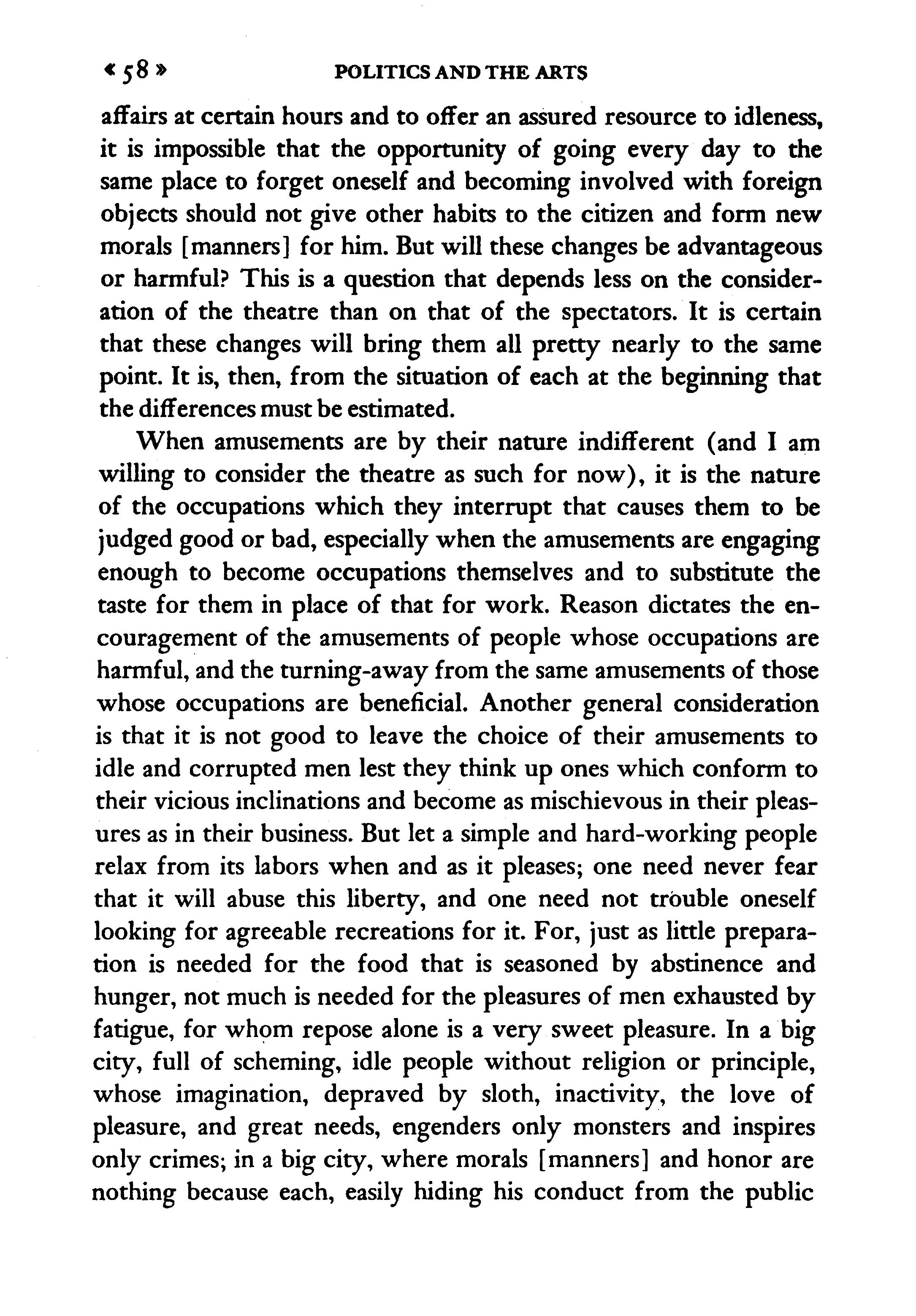
eye, shows himself only by his reputation and is esteemed only for his riches; in a big city, I say, the police can never increase the number of pleasures permitted too much or apply itself too much to making them agreeable in order to deprive individuals of the temptation ofseeking more dangerous ones. Since preventing them from occupying themselves is to prevent them from doing hann, two hours a day stolen from the activity of vice prevents the twelfth part of the crimes that would be committed. And all the discussionsin cafes and otherrefuges ofthe do-nothings and rascals of the place occasioned by plays seen or to be seen are also that much the more gained by men, either for their daughters' honor or that of their wives, or for their purse or that of their sons. But in small cities, in less populated places where individuals, alwaysin the public eye, are born censors ofone anotherand where the police can easily watch everyone, contrary maxims must be followed. If there are industry, arts, and manufactures, care must be taken against offering distractions which relax the greedy interest that finds its pleasures in itsefforts and enriches the prince from the avarice of hissubjects. Ifthe country, without commerce, nourishes its inhabitants in inaction, far from fomenting idleness in them, to which they are already only too susceptible because of their simple and easy life, their life must be rendered insufferable in constraining them, by dint of boredom, to employ time usefully which they could not abuse. I see that in Paris, where everythingis judged byappearancesbecause there isno leisure to examine anything, it is believed, on the basis of the apparent inactivity and listlessness which strikes one at first glance in provincial towns, that the inhabitants, plunged in a stupid inactivity, either simply vegetate or only pester one another and quarrel. This is an error which could easily be corrected if it were remembered that most of the literary men who shine in Paris and most of the useful discoveries and new inventions come from these despised provinces. Stay some time in a little town where you had at first believed you would find only automatons; not only will you soon see there
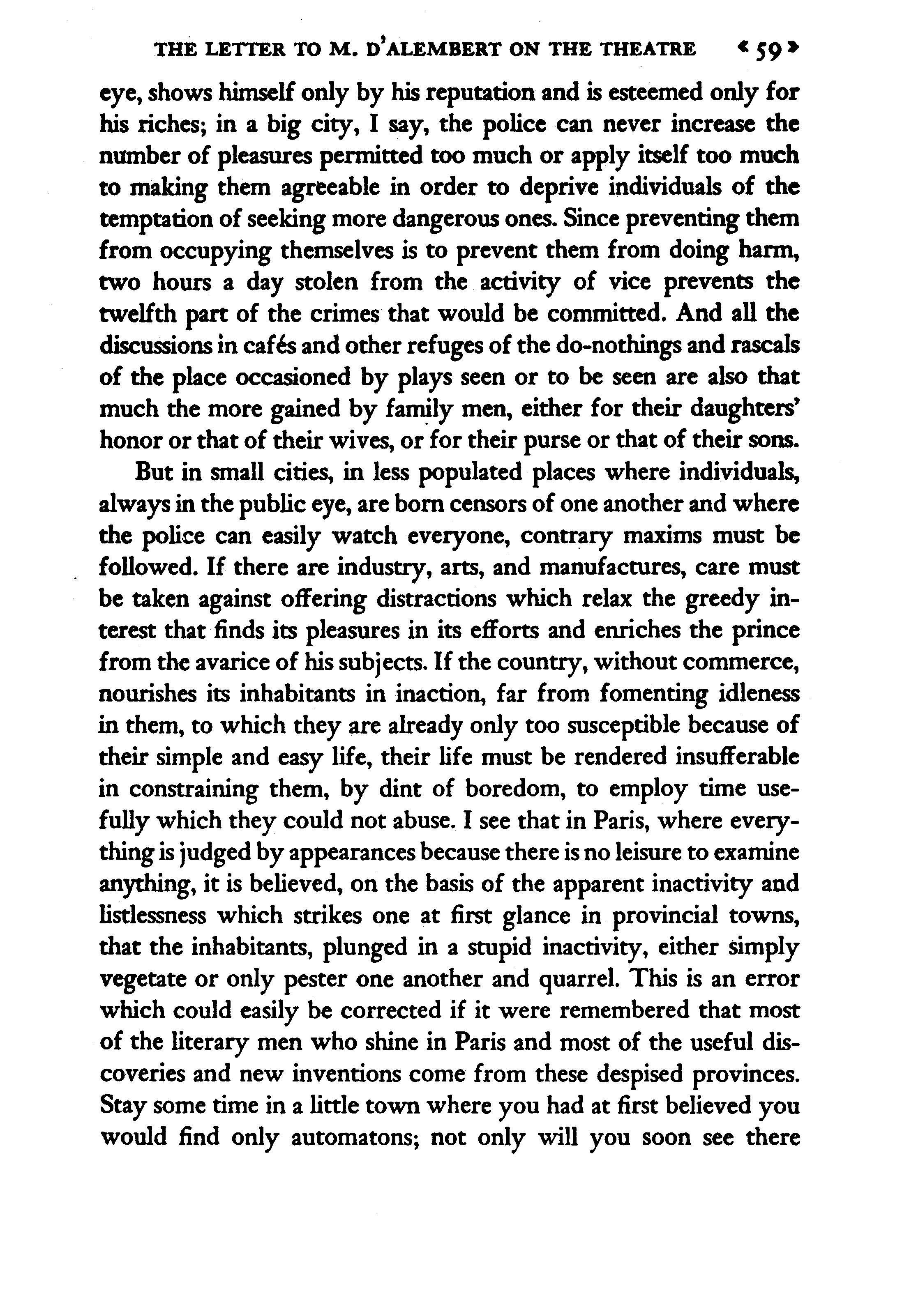
men a great deal more sensible than your big-city monkeys, but you will rarely fail to discover in obscurity there some ingenious man who will surprise you by his talents and his works, who you will surprise even mor.e in admiring them, and who, in showing you prodigies of work, patience, and industry, will think he is showing you only what is ordinary at Paris. Such is the simplicity of true genius. It is neither scheming nor busybodyish; it knows not the path of honors and fortune nor dreams of seeking it; it compares itself to no one; all its resources are within itself; indifferent to insult and hardly conscious of praise, if it is aware of itself, it does not assign itself a place and enjoys itself without appraisingitSelf.
In a little town, proportionately less activity is unquestionably to be found than in a capital, because the passions are less intense and theneedslesspressing, butmore original spirits, moreinventive industry, more really new things are found there because the people are less imitative; having few models, each draws more from himself and puts more of his own in everything he does; because the human mind, less spread out, less drowned in vulgar opinions, elaboratesitselfand ferments betterintranquil solitude; because, in seeing more is imagined; finally, because less pressed for time, thereismoreleisuretoextendand digestone'sideas.
I remember having seen in my youth a very pleasant sight, one perhapsunique on earth, in the vicinity of Neufchatel; an entire mountain covered with dwellings each one of which constitutes the center of the lands which belong to it, so that these houses, separated by distances as equal as the fortunes of the proprietors, offer to the numerous inhabitants of this mountain both the tranquillity of a retreat and the sweetness of society. These happy farmers, all in comfortable circumstances, free of poll-taxes, duties, commissioners, and forced labor, cultivate with all possible care lands the produce of which is theirs, and employ the leisure that tillage leaves them to make countless artifacts with their hands and to put to use the inventive genius which nature gave them. In
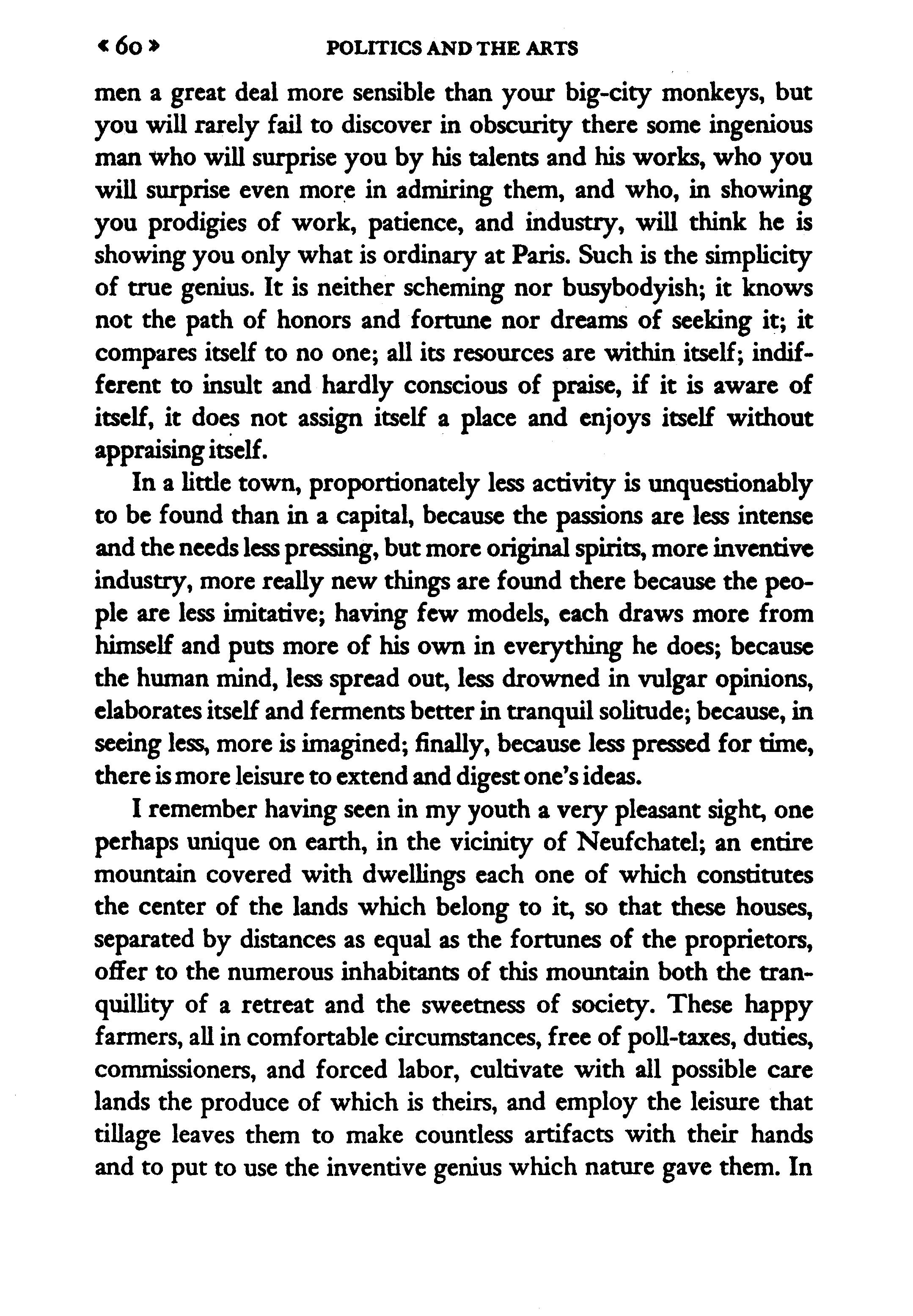
the winter especially, a time when the deep snows prevent easy communication, each, warmly closed up with his big family in his pretty and clean wooden house,·which he has himself built, busies himself with enjoyable labors which drive boredom from his sanctuary and add to his well-being. Never did carpenter, locksmith, glazier, orturner enter this country; each is everything for himself, no one is anything for another. Among the many comfortable and even elegant pieces of furniture which make up their household and adorn their lodgings, none is ever seen which was not made by the hand of the master. They still have leisure time left over in which to invent and make all sorts of instruments of steel, wood, and cardboard which they sell to foreigners; many of these even get to Paris, among others those little·wooden clocks that have been seen there during the last few years. They also make some of iron, and even make watches. And, what seems unbelievable, each joins in himself all the various crafts into which watchmaking is subdividedand makesall histools himself.
This is not all. They have useful books and are tolerably well educated. They reason sensibly about everything and about many things with brilliance.··They make syphons, magnets, spectacles, pumps, barometers, and cameras obscura. Their tapestry consists of masses of instruments of every sort; you would take a farmer's living room for a mechanic's workshop and for a laboratory in experimental physics. All know how to sketch, paint, and calculate a bit; most play the flute, many know something of the principles of
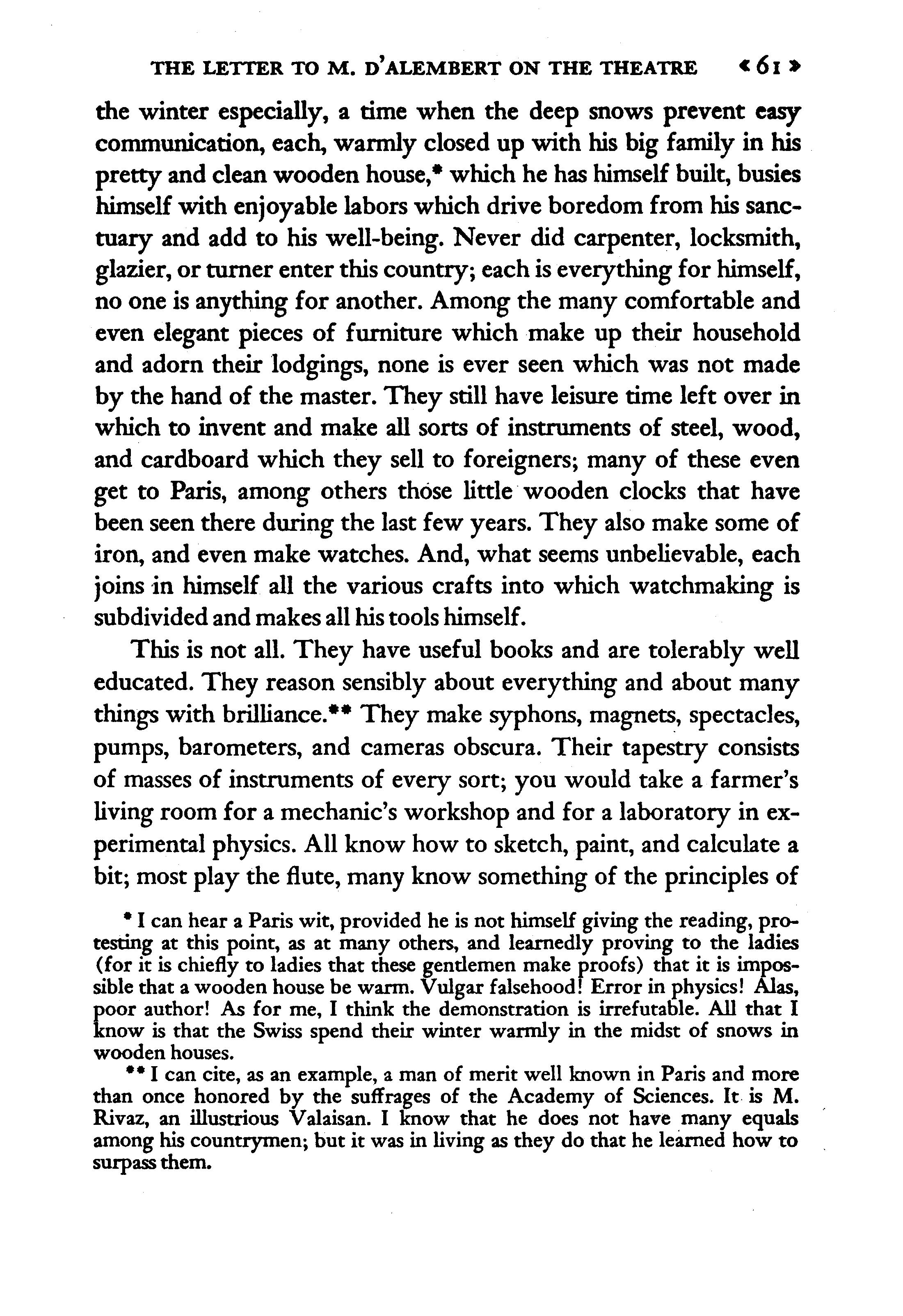
•I can hear a Paris wit, provided he is not himself giving the reading, protesting at this point, as at many others, and learnedly proving to the ladies (for it is chiefly to ladies that these gendemen make proofs) that it is impossible that a wooden house be warm. Vulgar falsehood! Error in physics! Alas, poor author! As for me, I think the demonstration is irrefutable. All that I know is that the Swiss spend their winter warmly in the midst of snows in wooden houses. •• I can cite, as an example, a man of merit well lrnown in Paris and more than once honored by the suffrages of the Academy of Sciences. It is M. Rivaz, an illustrious Valaisan. I know that he does not have .many equals among his countrymen; but it was in living as they do that he learned how to surpassthem.
music and can sing true. These arts are not taught them by masters but are passed down, as it were, by tradition. Of those I saw who knew music, one would tell me he had learned it from his father, another from his aunt, and a third from his cousin; some thought they had always known it. One of their most frequent amusements is to sing psalms in four parts with their wives and children; and one is amazed to hear issuing from rustic cabins the strong and masculine harmony of Goudimel so long forgotten by our learned artists.
I could no more tire ofwandering among these charmingdwellings than could the inhabitants of offering me the frankest hospitality. Unhappily I was young; my curiosity was only that of a child, and 1 thought more of amusing myself than learning. In thirty years the few observations I made have been erased from my memory. I only remember that I continually admired in these singularmen an amazing combination of delicacy and.simplicity that would be believed to be almost incompatible and that I have never since observed elsewhere. Otherwise I remember nothing of their morals [manners], their society, or characters. Today, when I would bring other eyes to it, am I never again to see that happy land? Alas,itisonthe road to myown.
After this sketch, let us suppose that at the summit of the mountain of 'which I have spoken, amidst the dwellings, a standing and inexpensive theatre be established under the pretext, for example, of providing a decent recreation for people otherwise constantly busy and able to bear this little expense. Let us further suppose that they get a taste for this theatre, and let us investigate whatwill betheresultsofitsestablishment.
I see, in the first place, that their labors will cease to be their amusements and that, as soon as they have anew amusement, it will undermine their taste for the old ones; zeal will no longer furnish so much leisure nor the same inventions. Moreover, everyday there will be real time lost for those who go to the theatre, and they will no longer go right back to work, since their thoughts will be full
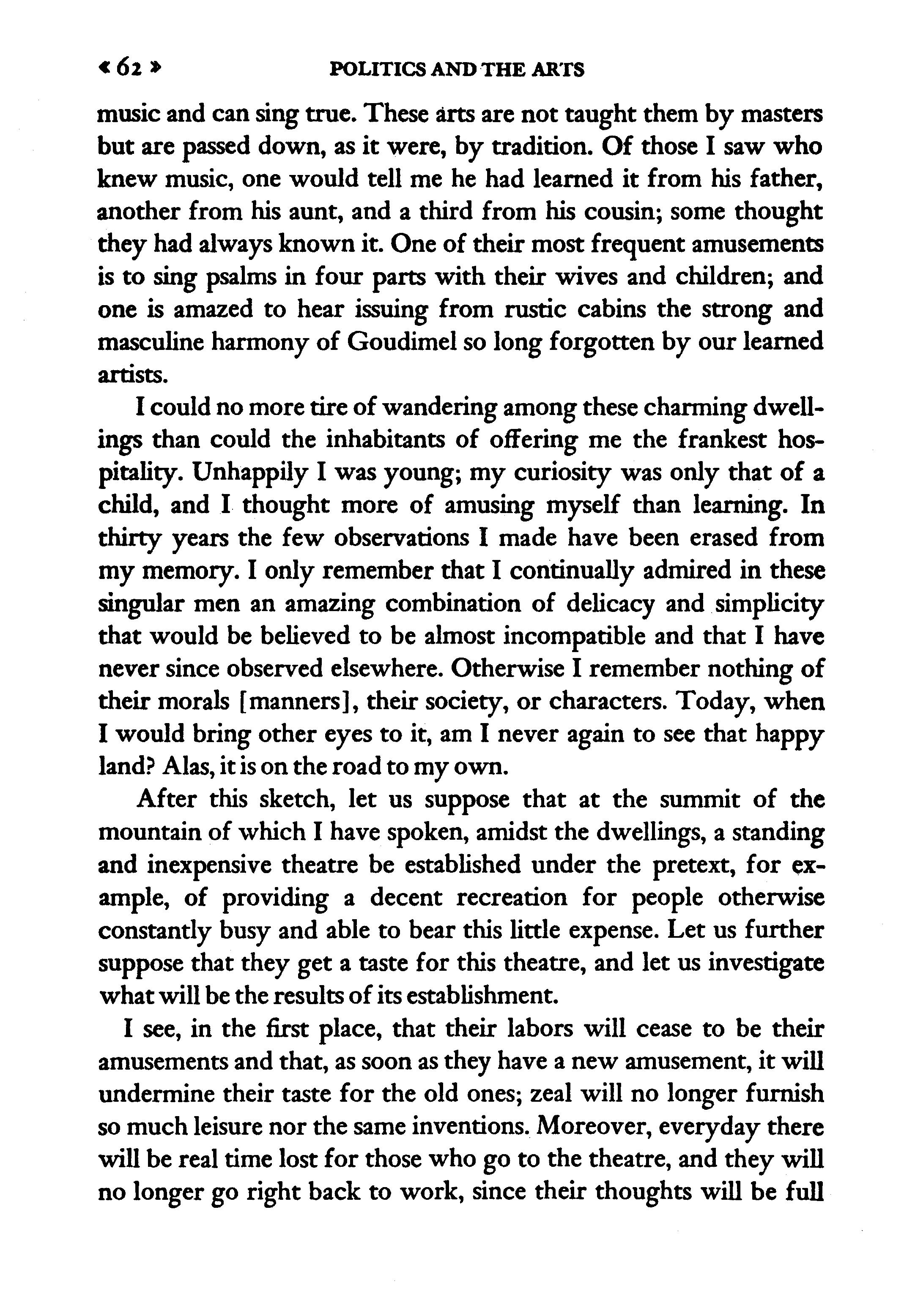
THE LETTER TO M. D'ALEMBERT ON THE THEATRE C 63 » of what they have justseen; they will talk about it and think about it. Consequently, slackeningofwork: first disadvantage.
However little is paid at the door, they do pay. It is still an expense that was not previously made. It costs for oneself and for one's wife and children when they are taken along, and sometimes they must be. In addition, a worker does not present himself in an assemblyin hisworkingclothes. He must puton hisSunday clothes, change linen, and powder and shave himself more often; all this costs time and money. Increase of expenses: second disadvantage.
Less assiduous work and larger expenses exact a compensation; it will be found in the price of what is produced, which must be madedearer. Many merchants, driven off by this increase, will leave the Mountaineers· and supply themselves from the neighboring Swiss who, being no less industrious, will have no theatre and will not increase their prices. Decrease in trade: third disadvantage.
During bad weather the roads are not passable; and, since the company must live in these seasons too, it will not interrupt its performances. Hence, making the theatre accessible at all seasons cannot be avoided. In the winter, roads must be made in the snow and, perhaps, paved; and God grant that they do not put up lanterns. Now there are public expenses and, in consequence, contributions from individuals. Establishment of taxes: fourth disadvantage.
The wives of the Mountaineers, going first to see and then to be seen, will want to be dressed and dressed with distinction. The wife of the chief magistrate will not want to present herself at the theatre attired like the schoolmaster's. The schoolmaster's wife will strive to be attired like the chief magistrate's. Out of this will soon emerge a competition in dress which will ruin the husbands, will perhaps win them over, and which will find countless new ways to get around the sumptuary laws. Introduction of luxury: fifth disadvantage.
All the rest is easy to imagine. Without taking into consideration the other disadvantages of which I have spoken or willspeak
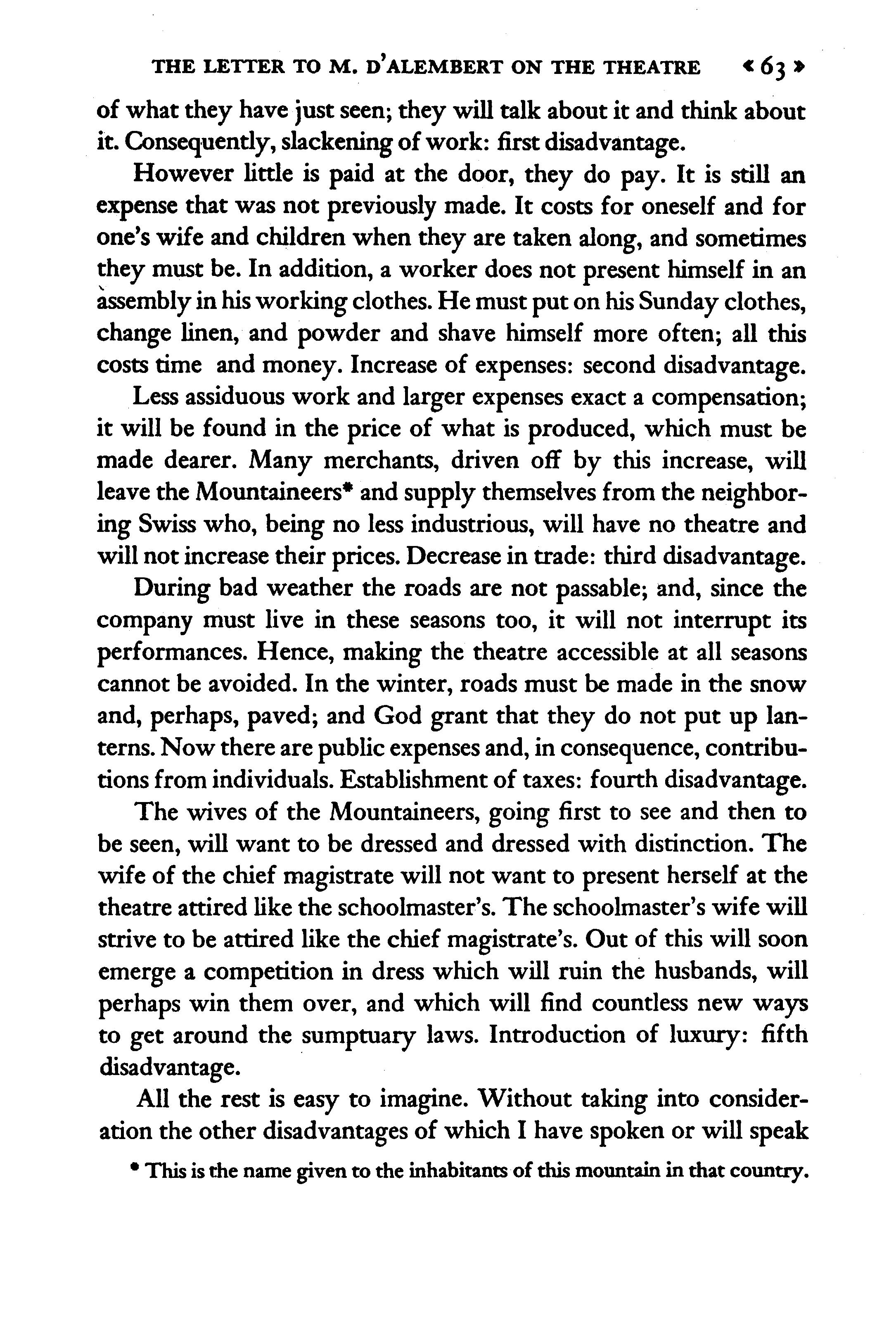
• This isthe name given to the inhabitants ofthis mountain in that country.
in what follows, without investigating the sort of theatre and its moral effects, I confine myself to arguments which have to do with work and gain; and I believe I have shown, by an evident inference, how a prosperous people, but one which owes its wellbeing to itsindustry, exchanging reality for appearance, ruins itself attheverymomentitwantstoshine.
Moreover, my supposition ought not to be objected to as chimerical. I present it merely as such and only want to render its inevitable consequences more or less obvious. Take away some circumstances andyouwill find otherMountaineerselsewhere; and mutatismutandis, theexamplehasitsapplication.
Thus, even if it were true that the theatre is not bad in itself, it would remain to be investigated ifit does not become so in respect to the people for which it is destined. In certain places it will be useful for attracting foreigners; for increasing the circulation of money; for stimulating artists; for varying the fashions; for occupying those who are too rich or aspire to be so; for making them less mischievous; for distracting the people from its miseries; for making it forget its leaders in seeing its buffoons; for maintaining . and perfecting taste when decency is lost; for covering the ugliness of vice with the polish of forms; in a word, for preventing bad morals [manners] from degenerating into brigandage. In other places it 'would only serve to destroy the love of work; to discourage industry; to ruin individuals; to inspire them with the taste for idleness; to make them seek for the means of subsistance without doing anything; to render a people inactive and slack; to prevent it from seeing the public and·private goals with which it ought to busy itself; to turn prudence to ridicule; to substitute a theatrical jargon for the practice of the virtues; to make metaphysic of all morality; to turn citizens into wits, housewives into bluestockings, and daughters into sweethearts out of the drama. The general effect will be the same on all men; but the men thus changed will suit their country more or less. In becoming equals, the bad will gain and the good will lose still more; all will contract
